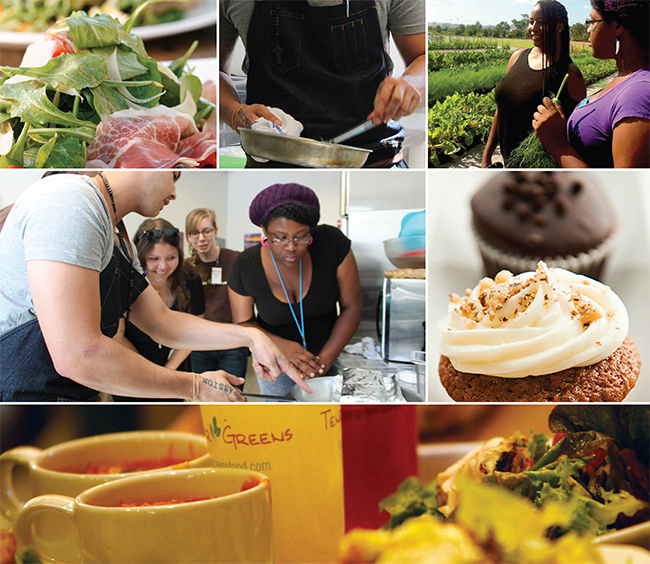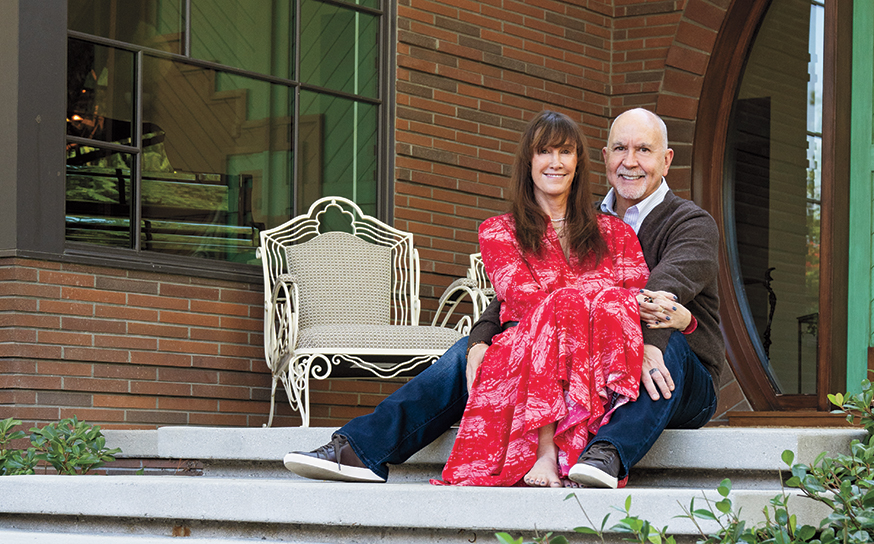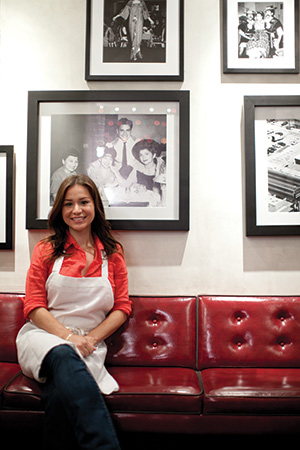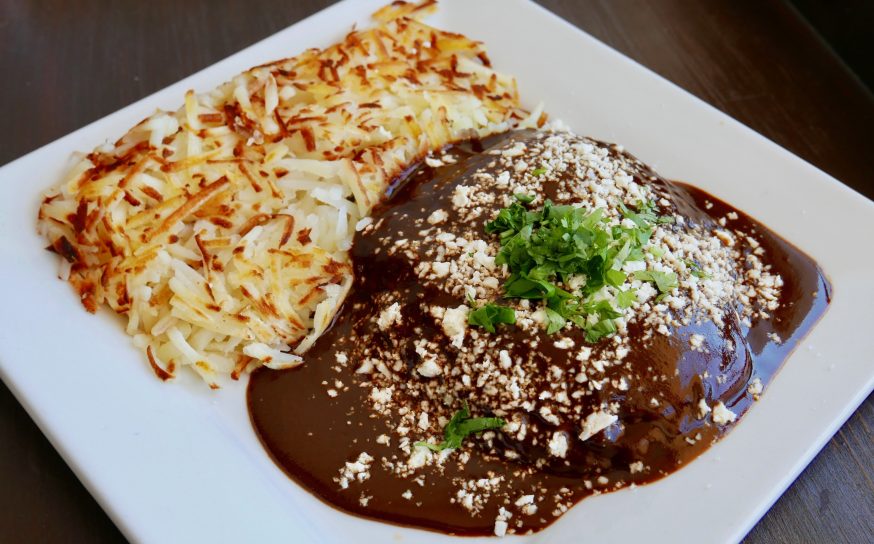
Doing the Right Thing Dish by Dish
Every new, health-oriented, sustainable restaurant touts that they’re progressive and “giving back” by offering organic, locally-farmed ingredients aimed at improving our health and the environment. But at Tender Greens, Erik Oberholtzer is not only walking the walk, he is talking the talk. The CEO is creating jobs for disadvantaged youths and, perhaps more importantly, hope.
-
CategoryPeople
-
Written byKaren Young
As a chef and businessman, Erik Oberholtzer has kept a keen eye on giving back. Five years ago he was working with a homeless youth program in Venice Beach, donating food from Tender Greens—the fast-casual, sustainable restaurant chain he cofounded in 2006, where he serves as CEO.
“We were feeding hungry kids, but it wasn’t enough,” stresses Erik. “We were feeding symptoms. What I wanted to do was break the cycle of poverty and dysfunction.”

The first thought that came to his mind was creating a job-training program at Tender Greens for homeless kids. “It worked for a while and we’d have a kid for six months, but then one by one they dropped out … life would interfere,“ he explains. “When you are homeless, there’s nowhere to sleep. It’s hard to show up.”
That’s when Erik realized a better approach might be to catch these kids before they hit the streets. He reached out to Covenant House, which serves at-risk youth including runaways, homeless and foster kids, and within the support system gives them a safe place to stay. “They do what we can’t do, so we became good partners,” he says. “From there we could focus on what we are experts at—jobs, food and farming.”
So just over two years ago, Erik created the Tender Greens Sustainable Life Project (SLP)—a six-month, paid internship program for emancipated foster and at-risk young adults. Upon completion, all interns have the opportunity to apply for a job. To date, 15 students have graduated. Eight are employed at Tender Greens, and five are working as interns.
With the program’s growth, Erik brought on Kate Briggs as program coordinator. She has since expanded SLP’s reach by finding interns through transitional housing programs, social workers, health care clinics and university groups. SLP has a rolling admittance, with the goal of having one intern assigned to each restaurant.
Currently there are 17 Tender Greens locations; a total of 30 are expected to roll out across California by the end of next year.
For the first three months, interns work two shifts a week in a fast-paced environment where they wash, dry and restock utensils and dishes. The last three months are spent learning essential restaurant skills like how to use a knife and prepare food.
“This is the stage where we find out who is dedicated,” says Erik. “It teaches them to show up body and spirit—and to understand that they are part of a bigger picture of working together to run a restaurant.”
One day a week the interns gather at Inner-City Arts in Downtown LA—a nonprofit facility that provides arts education classes free of charge to kids from high-poverty areas. Nestled among the many classrooms is a small kitchen where a Tender Greens chef holds court, instructing interns how to make everything from pasta “chicken-under-a-brick” to vegan chocolate cupcakes.
Interns are also required to take workshops on topics ranging from mindfulness and meditation to financial planning and goal-setting. In keeping with Tender Greens’ sustainability philosophy, there are field trips to the chain’s partners, such as Scarborough Farms, La Española Meats, Alegría Fresh (hydroponic), ReRide Ranch (hogs) and International Marine Products (fish).
“The content of each tour varies depending on the location and the tour guide,” explains Kate. “We have planted pumpkin patches, built structures for pigs and goats, cut lettuce greens for our own lunch and corralled piglets into new enclosures.”

culinary adventures Program coordinator Kate Briggs (second from left) with interns Jennifer Kates, Eva Hernandez, Neisha Price, Ernesto Yanes-Arnold and Tender Greens sous chef Charlie Knowles
The field trips are also open to all Tender Greens employees, as are some DIY-esque culinary classes, where students learn butchery, home beer-brewing, canning and jarring, cheese-making and meat-curing. As Erik sees it, the hands-on experience is aimed at sparking motivation.
“With all the trips, we’re working on fundamentals as well as some exposure to a romanticized farm world. It’s a source of inspiration. We don’t expect them to break down an entire pig or grow hydroponic plants, rather just to create passion and think, ‘I want to do this.’”
The program culminates in “discovery week,” where interns shadow either the culinary or pastry team or the employees working at registers to figure out a goal or a path toward full-time employment. Asia McGinnis, 27, says she discovered she loves working with people, so when her internship was over she got a job as a cashier at the Culver City location.
Most recently she helped train the new cashiers and employees in Studio City and moved on to do the same at the newest location in Downtown Los Angeles. Her favorite part of the SLP program is “definitely being able to work every station in the restaurant from dishwasher to salad-maker … working each station teaches hard work and motivates you to want more every day.”
Another former intern, Raniesha Newell, 21, was in the first graduating class and is now the head pastry chef at the West Hollywood location. “I just wanted to learn to cook, but when I tried pastry-making with the LA regional pastry chef, Annette Piccha, I came to love it. It took me a year and a half to become the lead pastry chef. The previous lead went to open the new Tender Greens in Burbank, so it gave me a great opportunity to step up.”
She aims to become an executive chef one day. “Sometimes it’s like I can’t believe where I’m at in my life,” says Raniesha, who spent her childhood bouncing to various homes but just bought her first car and has an apartment. “I’m really proud of myself and what I’ve accomplished so far.”
Sometimes the program exceeds expectations. “One of our graduates started with no real interest in the restaurant industry about a year ago … and will be starting at Le Cordon Bleu in January with the plan of eventually moving up to a head chef position,” relays Kate. “The internship teaches the interns a lot about themselves, about what they are capable of and about the rewards of their own hard work whether it is with Tender Greens or in their own particular line of interest.”

Back to Nature The interns visit Scarborough Farms in Oxnard, where Tender Greens sources most of its fruits and vegetables.
However, about 15% do drop out, according to Kate. Despite their best efforts, she says, “The internship isn’t for everyone, and unfortunately sometimes it just doesn’t work out.” Of the five interns currently in SLP, four are enrolled in a community college program.
Eva Hernandez, 18, is an orphan whose parents both passed away in the last four years. Although not in foster care, Eva was facing a similar situation: coming into adulthood without any financial or adult guidance. She found both at Tender Greens. The program nurtured her in other ways as well. “My mom’s cooking was comforting, so learning to cook is important because it benefits me and will help me live on my own.”
Jennifer Kates, 23, lived with three foster families between the ages of 5 and 18. She says she was always interested in cooking but didn’t know how. “I was fascinated that I could make a salad and like it,” shares Jennifer, who looks forward to “learning new ways of eating” and thinks about becoming a sous chef—or perhaps a hair stylist, because she’s studying that as well elsewhere. “It’s all about learning lots of skills to keep up in this economy,” she says.
Neisha Price, age 22, is a single mother with a 1-year-old. She came out of the foster care system and currently lives in a housing unit for young mothers. “I’ve never had the opportunity to learn so much, and everyone is so approachable,” she says. “I’m learning how to take care of myself and my baby—and want to work in the restaurant one day, maybe as a sous chef.”
Ernesto Yanes-Arnold, also 22, lived in three foster homes, 13 group homes and in cars on Skid Row. He is currently residing in transitional housing. He says SLP gives him a “feeling of knowing that you have a family … with support, loyalty … you know, people having your back.” He says he’d like to run a group home one day—and he’ll cook for them.
“We’re part training ground, part mentor, part parental guidance,” says Erik. “Every business and every entrepreneur has something to offer—and ultimately it begins to make an impact exponentially when people you’ve trained become the inspiration to others.”

Maple CINNAMON Apple Cheesecake Loaf Serves 12
Pound Cake:
2 sticks plus 2 tablespoons unsalted butter
3 cups plus 6 tablespoons granulated sugar
¼ teaspoon plus 1/8 teaspoon baking soda
¼ teaspoon salt
7 eggs
2 teaspoons vanilla
3 cups all-purpose flour
1 cup plus 2 tablespoons sour cream
Cream butter, sugar, baking soda and salt together. Add
eggs and vanilla. Then add flour and sour cream until well mixed. Set aside.
Maple Cheesecake:
8-ounce package cream cheese
1 cup sugar
3 tablespoons maple syrup
2 eggs
1/8 teaspoon salt
Cream the cream cheese, sugar and maple syrup together. Add eggs and salt. Continue to cream until smooth and well incorporated. Set aside.
Apple Jam:
8 apples, peeled, cored and cut into small chunks
½ cup granulated sugar
¾ cup light brown sugar
½ teaspoon cinnamon
1/8 teaspoon salt
½ lemon, squeezed
Put all ingredients into a medium pot, stir together and let cook for 20 to 35 minutes until slightly thickened. Remove from heat and let cool.
Streusel:
1 cup light brown sugar
1/3 cup sugar
2 teaspoons cinnamon
¼ teaspoon salt
1 cup unsalted butter
3 cups flour
Mix all ingredients together in a bowl until crumbly. Set aside.
Assembly and baking directions:
Preheat oven to 325º. In a mini-loaf pan lined with
parchment paper, pour the pound cake batter in a layer. Then pour and layer the cheesecake batter over the pound cake batter.
Spoon the apple jam over the top. Sprinkle the streusel topping across the top. Bake for 30 to 45 minutes.
**You can also use an 8-inch circle or square baking pan.











